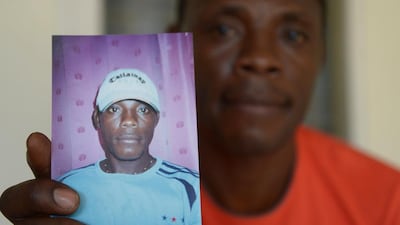It was the dream of sporting glory that drew talented Cameroonian striker Salomon Bengondo to Indonesia, but his story ended in poverty, illness and an untimely death, in a country failing to pay its footballers.
The withholding of wages by Indonesian clubs has reached “catastrophic proportions” according to international players’ union FIFPro, and Bengondo is the second foreign player known to have died after going unpaid.
In 2012, the Paraguayan striker Diego Mendieta died of a viral infection after he, too, was unable to afford treatment, following months without wages.
Bengondo arrived in Indonesia in 2005, a promising young footballer who hoped to build a career in Southeast Asia’s biggest nation.
“He had every chance, he had great hopes,” his brother Beliby Ferdinand said this week at the modest house they used to share, near the capital Jakarta.
Bengondo died last month at age 32, unable to afford hospital treatment for a mystery illness. His former club, Persipro Bond-U, still owed him large sums of money, according to his brother and Indonesian football officials.
Like many African players, Bengondo came to Indonesia in search of a higher salary. While the wages may not be in the same league as European clubs, Indonesian sides are generally better-paying than those in Africa.
He was so incensed at his treatment that he took to the streets to beg in protest with his African teammates in 2012, apparently with little effect. “The club still did nothing,” Ferdinand, 27, said.
Brendan Schwab of FIFPro warned the issue of Indonesian clubs failing to pay players had reached “literally catastrophic proportions”.
“We can’t think of a country in the world of football where the problems of the players are more pronounced or more serious than Indonesia,” said Schwab, the head of FIFPro’s Asian division.
It is not just the foreign players who are going unpaid. The Indonesian professional footballers’ association (APPI) says 14 clubs in the country’s two top-tier divisions still owe salaries from the 2012/13 season.
Bengondo played for several clubs and was signed by Persipro, based in Probolinggo in the east of the main island of Java, for the 2011/12 season. The club is in the Premier Division, the second-highest level of football in Indonesia.
But according to his brother, Bengondo received only 20 million rupiah (around Dh6,000) when he started with the club, and nothing afterward.
He was supposed to receive an extra lump sum and 16,625,000 rupiah a month for eight months, according to a copy of his contract.
Persipro could not be contacted for comment on Bengondo’s case despite repeated attempts by AFP to get in touch with the club.
Despite the lack of salary, Bengondo played for the club until the end of the season before returning to the city of Tangerang, outside Jakarta, where he lived with his brother.
He already felt unwell, suffering from chest pains as well as stomach problems, Ferdinand said.
In Tangerang he continued to train with other Cameroonians and eked out a living playing in occasional matches between villages.
Towards the end of November, he began feeling increasingly ill and visited a local hospital and later a clinic where he underwent tests and was given medication to help with his stomach problems.
As his health deteriorated, he would have liked to seek treatment at a bigger hospital or even return to Cameroon.
But he did not have the means and his repeated appeals to Persipro for payment failed, his brother said. He died November 29.
His brother said the cause of death remains unclear as the family awaits the results of an autopsy.
Bengondo’s body was flown back to Cameroon earlier this month with funding from the Indonesian Football Association (PSSI).
Ferdinand, also a footballer but currently not signed to any club, said he still hoped to claw back the money from Persipro and then return to Cameroon. The APPI is also trying to help.
Djohar Arifin Husin, the PSSI chairman, said clubs were suffering funding problems as competition for sponsorship was tough, and since 2011 professional teams have been banned from getting local government funding, a vital source of revenue in the past.
Attempts to improve players’ rights have also been overlooked in recent years as Indonesian football chiefs struggled to resolve a feud between two rival federations, which spawned two top-tier divisions. Both sides agreed in March to reunite under the PSSI after world governing body Fifa warned Indonesia could be banned from international competition.
Despite the distractions, Husin insisted the PSSI is trying to resolve the issue of players going unpaid. Clubs were given a deadline of January 15 to pay outstanding salaries or face being banned from competitions.
But such commitments are unlikely to reassure Ferdinand after his bitter experience in the world of Indonesian football.
“Footballers are not respected in this country,” he said.
sports@thenational.ae

